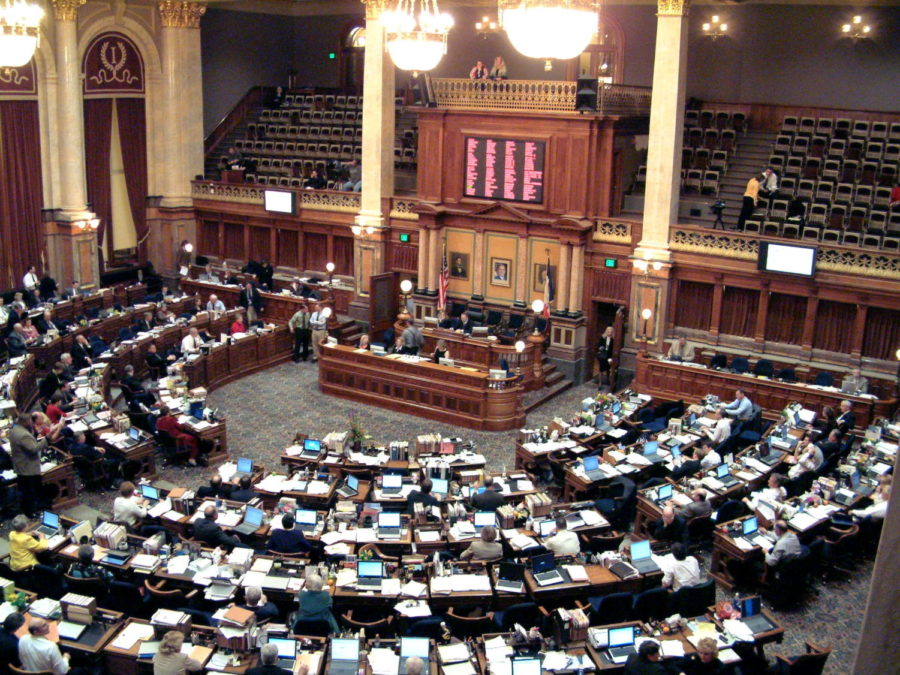Iowa Legislature votes to require in-person learning while looking to expand school choice
January 31, 2021
Iowa public schools are at the forefront of the GOP-controlled Legislature’s agenda, pushing two education bills to expand on school choice and require schools to provide in-person instruction five days a week.
Throughout the pandemic, Gov. Kim Reynolds remained adamant about getting students back in the classroom. The bill passed the Senate by a 29-18 vote Thursday and made it through the House by a 59-39 vote. All Republicans in both chambers voted in favor of requiring an in-person option, with one Democrat in the House to cross party lines and vote in favor of the bill.
Iowa schools that offer hybrid instruction will be required to provide parents and guardians the choice of enrolling their students in fully in-person classes.
Iowa representatives who supported the bill largely represent Iowa’s rural districts, while those who opposed represented cities including Des Moines, Davenport, Iowa City, Cedar Rapids and Waterloo.
Iowa State Education Association (ISEA) President Mike Beranek said the majority of Iowa schools already offer an in-person option for learning and the bill will only impact roughly 25 percent of schools. Beranek said school districts should be able to make the choice based on COVID-19 positivity rates in the county.
“We fully believe our students need to be in school… but we also want those buildings to be safe and healthy environments,” Beranek said.
Iowa educators are in the 1B phase in the distribution of vaccines but depending on the time of implication, teachers may be returning to class without a vaccination.
“We were hoping there would be a lag time from the implication of the bill to allow for all of our educators who wanted to be vaccinated to get vaccinated,” Beranek said.
The measure brings in-person instruction on the first Monday two weeks after Reynolds signs the bill into effect and would not extend until after June.
“The way things are going in the state, it doesn’t look like all of our educators will be awarded the opportunity to receive the vaccine within two weeks,” Beranek said. “So we were really hoping there would be logic that follows the bill that was signed, but that didn’t get added to the bill.”
The second bill, introduced by Reynolds to expand on school choice, would provide scholarships to help students attend private schools. Funding for the scholarships will come from public dollars. Three Republicans voted against the bill in a 26-21 vote, sending the bill to the House.
The bill also expands on students’ eligibility to open enroll, allowing students to attend schools regardless of the district they live in.
“At its heart, Senate File 159 is a bill that places parents back in the driver’s seat for their child’s very personal educational journey,” Sen. Amy Sinclair, R-Allerton, said.
Democrats think otherwise, stressing public funds are allocated for public schools and should remain separate from private institutions.
Beranek said the voucher bill is something education in Iowa does not need.
“We believe that a taxpayer in Iowa is paying their taxes to help support public service and public education is a service that all of our children out of state should be awarded the opportunity to attend for free,” Beranek said.
Every child who attends one of 35 schools in the state identified in need of comprehensive assistance would be eligible to receive these funds. Each child in these schools would have the opportunity to receive $5,200.
Beranek said the allocation would need to be over $50 million to allow all students in these districts to receive a scholarship and it would only benefit roughly 10,000 students. This sum is over double the amount of additional funds Reynolds’ budget allocated to public schools in this year’s budget.
Money for the $50 million will come from public education funding that covers an array of expenses including personnel. In Iowa, funding for education has continually dwindled.
“We are far behind where we should be in allocated resources for our schools in the state and now on top of a reduction of a 10-year period, we are also looking at pulling off another $50 million for a side program,” Beranek said.
Senators who supported the bill largely represented districts home to Iowa’s rural areas and argued students of lower economic standing would benefit from the bill. Beranek said this narrative is false and oftentimes students seeking private education are of a higher economic status who can afford the option.
Of the 360 school districts in Iowa, 240 school districts do not have access to nonpublic schools. Out of the 19 school districts in need of comprehensive assistance, nine of them are not in close proximity to a private school for children to attend, according to Beranek.
“Almost half of the individuals that she, the governor, is talking about does not have access to be able to spend the money that she would like to reappropriated away from public schools,” Beranek said.
Mack Shelley, chairman of the political science department, said on general terms Conservatives have an unfavorable view on the public sector, including public education.
“If you take money from public schools and then keep complaining about how they are underperforming, there is kind of a lack of logical connectivity there,” Shelley said. “If they are underperforming it seems logical to provide more resources.”

















